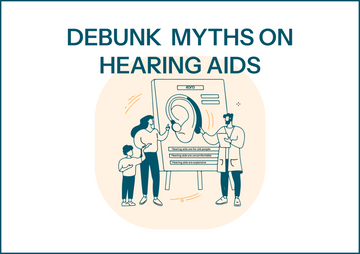Family and friends are at the heart of life’s best moments, the laughter around the dinner table, the shared stories on a quiet evening, and the simple joy of a friendly chat. If someone you care about has started wearing hearing aids, they’ve already taken a brave step toward reconnecting with these moments.
For a long time, they may have struggled, missing parts of conversations, feeling left-out in group settings, or even withdrawing from social activities. With hearing aids, they’re able to hear the world around them in a way they haven’t for a long time. And your support can make all the difference in helping them adjust with confidence and joy.
This journey isn’t just about hearing better only, it’s about being part of the moment and enjoying everyday interactions again. With patience, encouragement, and a little bit of fun, you can help them embrace this new chapter, making the transition smoother and more enjoyable for both of you.
Tip 1: Set Realistic Expectations for a Smooth Adjustment
Adjusting to hearing aids is a journey, and like any exciting new chapter, it takes time! The wearer and their loved ones should embrace the process with patience and understanding. It’s normal for it to take a little while for the brain to adjust, and that’s okay! Instead of expecting immediate perfection, celebrate the small wins. Maybe it’s hearing a phone ring for the first time in a while, or joining a conversation with a little more ease. Keep setting little goals, like wearing the hearing aids for a few hours each day or testing them out in different settings, like at family meals or while on a walk. The most important thing is to stay patient, communicate openly about challenges, and remind each other that the goal is gradual progress, not perfection.
Tip 2: Celebrate Progress
Adjusting to hearing aids is all about those small victories, hearing a favorite song again or catching a joke in a group is huge. These wins build confidence. So, instead of focusing on what’s still tricky, cheer them on for what’s improving. Confidence grows with each win, and Success is the sum of small efforts, repeated day in and day out.
Tip 3: Make Conversations Easier and More Fun
To make conversations smoother, try to face the person when speaking. This way, they can read your lips and pick-up on facial expressions, adding extra clarity. There’s no need to shout, just speak clearly and at a normal pace. It’s all about making things as easy to understand as possible. Reducing background noise can also help. Turning down the TV or finding a quieter space to chat can make a big difference. You can even make it a little more enjoyable by watching movies with subtitles or playing listening games together. For example, try a simple “sound scavenger hunt”—take turns identifying different sounds in the room or outside, like the sound of a clock ticking or birds chirping. It’s a fun way to help them adjust to new sounds while keeping the mood light and supportive.
Tip 4: Helping Them Feel Included in Social Settings
Social situations can sometimes feel overwhelming when adjusting to hearing aids, so it’s important to help them feel included. If they’re having trouble keeping up, subtly repeat or rephrase key points without drawing attention. Start with smaller gatherings where they feel more comfortable, and plan activities that don’t rely solely on hearing, like board games. It’s all about ensuring they feel part of the conversation and the fun, without any pressure.
Tip 5: Showing Support Through Actions
Support goes beyond words, it's in the little things. If they need help with hearing aid maintenance, like changing batteries or cleaning, offer to assist. With today’s technology, many hearing aids come with Bluetooth connectivity and apps to adjust settings, so helping them get familiar with these features can be a huge support. Above all, reinforce that hearing aids are tools for connection, not a limitation. Your practical support helps them feel more comfortable and confident as they adjust.
Emotional Journey
For family and friends, life before hearing aids often meant repeating things, raising voices, and dealing with frequent misunderstandings; leaving everyone feeling a bit worn out. Watching TV too loud, repeating the same sentence, or navigating social gatherings as an unofficial "interpreter" could wear everyone down. So when a loved one finally decides to get hearing aids, it's a moment of real relief. Conversations become much more manageable. It’s a beautiful reminder that good communication is at the heart of every strong relationship.
For the person wearing hearing aids, the journey is emotional in a different way. There may have been months, maybe even years of struggling in silence, feeling left out, or pretending to understand when they didn’t. Choosing to get hearing aids is a brave step. And while the adjustment phase can still bring some ups and downs, having loved ones cheer them on with patience and kindness makes all the difference.
Adjusting to hearing aids is a journey that takes time, but with the support of family and friends, it becomes a lot easier. By setting realistic expectations, celebrating milestones, and providing practical help, you can play a key role in making this transition smoother. Whether it’s helping with technology, offering encouragement, or simply being present, your support makes all the difference. Together, you’ll rediscover the joy of clear communication and form stronger bonds.
























